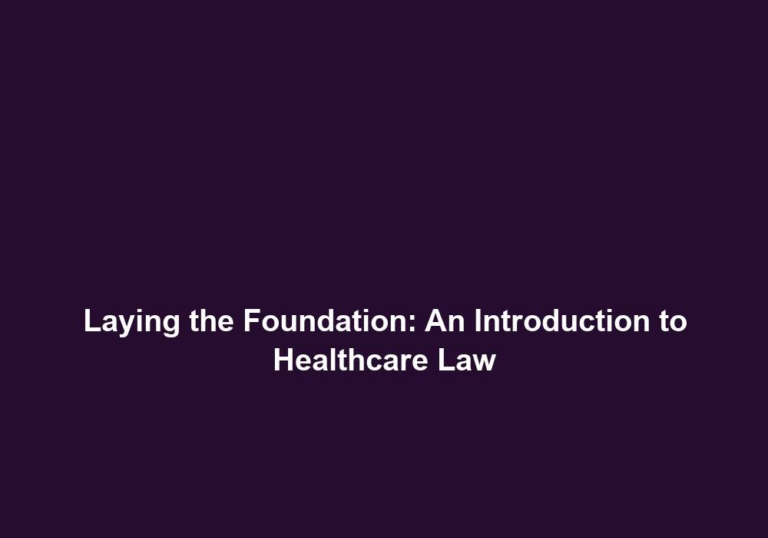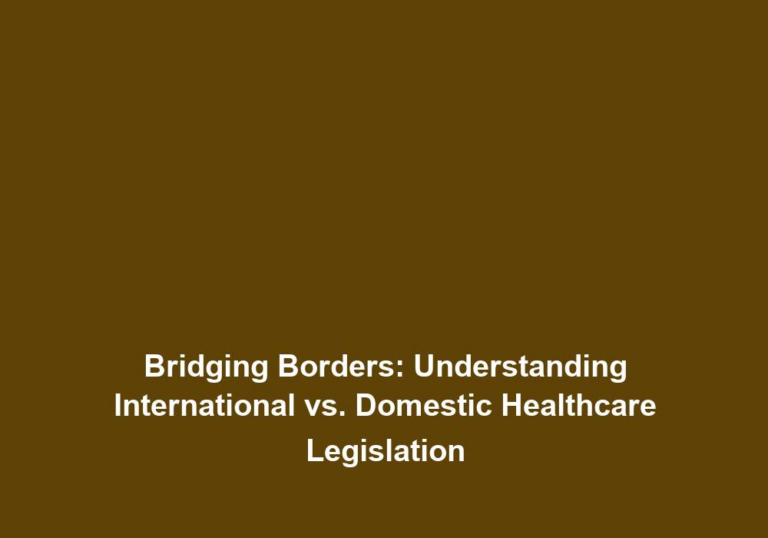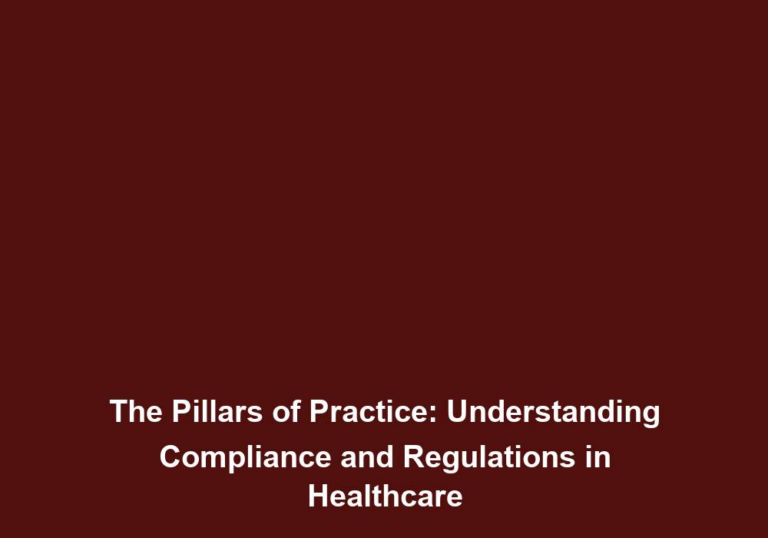Healthcare and the Law: A Comprehensive Introduction
In today’s complex and ever-evolving healthcare landscape, the intersection of healthcare and the law plays a crucial role in shaping the delivery, regulation, and ethics of healthcare services. The legal framework that governs healthcare encompasses a wide range of areas, including medical malpractice, patient rights, healthcare policies, insurance regulations, and ethical considerations. This comprehensive introduction aims to shed light on the key aspects of healthcare and the law, providing a deeper understanding of this critical field.
The Importance of Healthcare Law
Healthcare law serves as the foundation for ensuring the provision of quality healthcare services while safeguarding the rights and interests of both healthcare providers and patients. It establishes the legal guidelines and standards that healthcare organizations, professionals, and institutions must adhere to, promoting accountability, patient safety, and ethical practices within the healthcare industry.
Healthcare law plays a pivotal role in maintaining the integrity and trust within the healthcare system. By defining the legal obligations of healthcare providers, it ensures that patients receive safe and effective care. The law sets standards for healthcare professionals, requiring them to exercise reasonable care and skill in the diagnosis and treatment of patients. This accountability helps protect patients from negligent practices and holds healthcare providers responsible for their actions.
Additionally, healthcare law safeguards patient rights, ensuring that individuals have autonomy over their healthcare decisions. It establishes principles such as informed consent, which allows patients to make informed choices about their treatment options. Furthermore, healthcare law protects patient privacy and confidentiality, preventing unauthorized access to medical records and ensuring that sensitive information remains secure.
Key Areas of Healthcare Law
1. Medical Malpractice
Medical malpractice refers to professional negligence on the part of healthcare providers that results in harm or injury to patients. This area of healthcare law focuses on establishing the duty of care owed by healthcare professionals, determining the breach of that duty, and evaluating the resulting damages. Medical malpractice lawsuits aim to compensate patients for their injuries and hold healthcare providers accountable for their actions.
In cases of medical malpractice, patients may suffer physical, emotional, or financial harm due to the negligence of healthcare professionals. The duty of care owed by healthcare providers requires them to act with the same level of skill and care that a reasonably competent professional would provide in similar circumstances. When this duty is breached, and harm occurs as a result, patients have the right to seek legal recourse.
Medical malpractice cases can involve various scenarios, including misdiagnosis, surgical errors, medication mistakes, or failure to obtain informed consent. These lawsuits not only provide compensation to the victims but also serve as a deterrent for healthcare providers, encouraging them to maintain a high standard of care.
2. Patient Rights
Patient rights are fundamental principles that ensure individuals have the right to make informed decisions about their healthcare, access quality care, and maintain privacy and confidentiality. Healthcare laws governing patient rights encompass areas such as informed consent, access to medical records, right to refuse treatment, and protection against discrimination or exploitation.
Informed consent is a cornerstone of patient rights, requiring healthcare providers to disclose relevant information about diagnoses, treatment options, risks, and benefits before obtaining a patient’s consent for any medical intervention. This empowers patients to actively participate in their healthcare decisions and ensures that their autonomy is respected.
Furthermore, healthcare laws protect patients from discrimination or exploitation based on factors such as race, gender, age, or disability. They promote equal access to healthcare services and prohibit any form of unjust treatment or denial of care based on discriminatory grounds.
3. Healthcare Policies and Regulations
Healthcare policies and regulations play a crucial role in shaping the overall healthcare landscape. These laws are enacted by government bodies at local, state, and federal levels to establish standards for healthcare delivery, insurance coverage, and patient protection. Policies related to healthcare reform, insurance coverage, and public health initiatives fall under this domain.
Healthcare policies and regulations aim to ensure that healthcare services are accessible, affordable, and of high quality. They define standards for healthcare facilities, professionals, and institutions, outlining requirements for licensure, accreditation, and ongoing compliance. These laws also address issues such as healthcare financing, reimbursement mechanisms, and the provision of essential services.
Public health policies are another vital component of healthcare laws. They focus on preventing the spread of diseases, promoting immunization, and implementing measures to protect the health of communities. These policies address issues such as infectious disease control, food and drug safety, and emergency preparedness.
4. Insurance Regulations
Insurance regulations within healthcare law focus on the rules and guidelines governing health insurance plans, including their administration, coverage, and payment processes. These regulations aim to ensure fair and transparent practices within the insurance industry, protect patients from inadequate coverage, and prevent healthcare fraud and abuse.
Health insurance regulations establish the rights and responsibilities of both insurers and policyholders. They set standards for the types of services that must be covered, the process of claims submission and reimbursement, and the mechanisms for resolving disputes. These regulations also address issues such as pre-existing conditions, network adequacy, and the availability of essential health benefits.
By implementing insurance regulations, healthcare laws strive to enhance the affordability and accessibility of healthcare services. They aim to protect patients from financial hardship due to medical expenses, promote equitable coverage, and prevent discriminatory practices in insurance plans.
5. Ethical Considerations
Ethical considerations in healthcare law encompass a wide range of issues, including end-of-life care, organ transplantation, genetic testing, and research involving human subjects. These laws and guidelines aim to balance the individual’s right to autonomy with the need for societal benefits and the ethical responsibilities of healthcare providers.
End-of-life care laws address the complex decisions surrounding the withdrawal or withholding of life-sustaining treatment, advance directives, and the appointment of healthcare proxies. They ensure that patients’ wishes regarding their care, particularly in situations where they are unable to communicate, are respected and followed.
Organ transplantation laws regulate the donation and transplantation of organs, ensuring fairness, transparency, and ethical practices in the allocation process. These laws establish criteria for organ procurement, recipient selection, and the prevention of organ trafficking.
Genetic testing laws govern the use and disclosure of genetic information, protecting individuals from genetic discrimination and ensuring the responsible use of genetic data. They address issues such as privacy, informed consent, and the use of genetic information in healthcare decision-making.
Research involving human subjects is another area governed by ethical considerations in healthcare law. Laws and regulations protect the rights and welfare of participants in clinical trials and other research studies. They establish guidelines for informed consent, privacy protection, and the ethical review of research protocols.
The Role of Healthcare Lawyers
Healthcare lawyers play a vital role in navigating the complex legal landscape of the healthcare industry. They provide legal guidance and representation to healthcare organizations, professionals, and patients, ensuring compliance with healthcare laws and regulations. Healthcare lawyers assist in the preparation and review of contracts, advise on risk management strategies, and represent clients in medical malpractice lawsuits or disputes related to healthcare policies and regulations.
Healthcare lawyers possess a deep understanding of the intricacies of healthcare law. They help healthcare providers and institutions navigate the legal requirements governing their operations, ensuring that they comply with applicable laws and regulations. This includes assisting with the development and implementation of policies and procedures that meet legal standards, such as those related to patient privacy, informed consent, and billing practices.
Furthermore, healthcare lawyers play a crucial role in representing clients in legal disputes, including medical malpractice cases. They work closely with healthcare professionals and patients to gather evidence, analyze medical records, and develop compelling legal arguments. Healthcare lawyers also negotiate on behalf of their clients, aiming to achieve fair settlements or favorable outcomes in litigation.
In addition to their advisory and advocacy roles, healthcare lawyers stay abreast of the latest developments and emerging trends in healthcare law. They continuously update their knowledge and skills to ensure that their clients receive the most accurate and up-to-date legal advice.
Emerging Trends in Healthcare Law
As healthcare continues to evolve, new challenges and considerations arise, leading to emerging trends in healthcare law. Some of these trends include:
- Telemedicine and Telehealth: The increasing use of technology in healthcare delivery has sparked the need for regulations and guidelines specific to telemedicine and telehealth services. Healthcare laws are adapting to address issues such as licensure, reimbursement, privacy, and security concerns in the context of remote healthcare consultations and services.
Telemedicine and telehealth have revolutionized the way healthcare services are delivered, allowing patients to receive medical care remotely through digital platforms. However, this innovative approach also presents unique legal and regulatory challenges. Healthcare laws are evolving to ensure that telemedicine services are provided by qualified professionals, that patient privacy is protected during virtual consultations, and that reimbursement mechanisms are in place to support telehealth initiatives.
- Data Privacy and Security: With the digitization of healthcare records and the collection of vast amounts of patient data, protecting the privacy and security of this information has become paramount. Healthcare laws now focus on establishing safeguards, protocols, and penalties related to the collection, storage, and use of patient data.
The advent of electronic health records and health information exchange systems has facilitated the sharing of patient data among healthcare providers, improving care coordination and efficiency. However, this increased accessibility to patient information also raises concerns about data breaches and unauthorized access. Healthcare laws address these issues by requiring healthcare organizations to implement robust data security measures, such as encryption and access controls, to safeguard patient information.
- Healthcare Fraud and Abuse: Healthcare fraud and abuse continue to be significant concerns within the industry. Healthcare laws aim to prevent fraudulent practices, such as overbilling, kickbacks, and false claims, by imposing strict penalties and providing mechanisms for reporting and investigation.
Instances of healthcare fraud and abuse not only result in financial losses but also compromise patient care and trust. To combat these unlawful practices, healthcare laws establish anti-fraud provisions and empower governmental agencies to investigate and prosecute offenders. They also encourage individuals to report suspected fraud through whistleblower protections and reward programs, thereby promoting accountability and deterring fraudulent activities.
- Healthcare Access and Equity: Ensuring equitable access to healthcare services is a pressing concern. Healthcare laws are evolving to address disparities in healthcare access, promote affordable care, and protect vulnerable populations from discrimination.
Access to healthcare services is influenced by various factors, including socioeconomic status, geographic location, and cultural barriers. Healthcare laws strive to eliminate these disparities by enacting policies that expand healthcare coverage, enhance Medicaid programs, and encourage the establishment of safety-net clinics and hospitals in underserved areas. Furthermore, healthcare laws prohibit discrimination based on protected characteristics, ensuring that all individuals have equal access to quality care.
In conclusion, healthcare and the law are intricately intertwined, shaping the way healthcare services are delivered, regulated, and ethically practiced. By understanding the key areas of healthcare law, the role of healthcare lawyers, and emerging trends, stakeholders within the healthcare industry can navigate the legal complexities and contribute to a healthcare system that prioritizes patient care, safety, and ethical practices.
Please note that the response provided is generated by an AI language model. While it strives to provide accurate and up-to-date information, it is always recommended to consult with a legal professional or specialist when dealing with specific legal matters.







